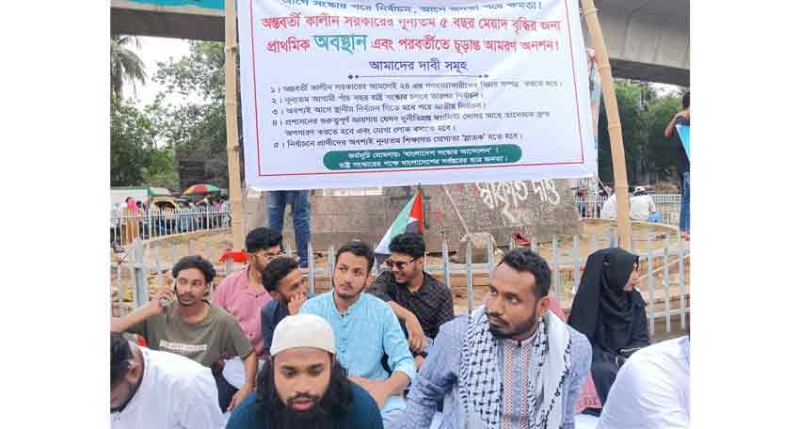- UNRWA Situation Report on Crisis in Gaza & Occupied West Bank |
- Intimidation or bloodshed cannot halt Bangladesh’s march to democracy |
- Khaleda Zia integral to an important chapter in BD history: Yunus |
- Enthusiasm marks Victory Day celebrations across Bangladesh |
- Dhaka-Delhi ties deep; to be shaped by trust, dignity, mutual respect |
Bangladesh Sangskar Andolon calls for 5-yr Interim Govt

A broad coalition of students and citizens under the banner
of Bangladesh Sangskar Andolon (Bangladesh Reform Movement) has launched a
campaign demanding sweeping structural reforms before any elections are held.
With the slogan "Reforms First, Then Elections; People First, Then
Power," the movement has gained rapid momentum, reflecting widespread
frustration with the current state of governance.
On Friday, April 18, protesters gathered in the capital and announced a series of reform-focused demands, warning that they would initiate an indefinite hunger strike if the government fails to establish a minimum five-year interim administration. This transitional government, they say, must be tasked with rebuilding state institutions and democratic mechanisms to restore public confidence in the electoral process.
The call for reform comes amid growing public outrage over what activists describe as the “2024 massacre,” referring to recent incidents of violence linked to political unrest. Movement leaders stressed that those responsible for the bloodshed must be brought to justice during the interim government's tenure, warning that impunity would only deepen the nation's democratic crisis.
Among the central themes of their proposal is a complete overhaul of the electoral system. The reform campaign insists that no national election should be held before local government elections are conducted, arguing that democracy must be rebuilt from the grassroots level. According to them, restoring trust in representative institutions can only be achieved by first empowering local governance structures and ensuring free and fair elections at the community level.
The group also demands the immediate removal of corrupt and authoritarian individuals from key positions of power within the administration. They argue that such posts must be filled with capable, qualified professionals who are selected based on merit, not political affiliation or loyalty. Only then, they argue, can the state machinery serve the people rather than party interests.
Further, the movement proposes raising the minimum educational qualification for election candidates to a bachelor’s degree, asserting that leadership roles in governance demand a foundational level of academic understanding. “We need leaders who are capable of informed decision-making and long-term vision,” said one spokesperson. “Without basic educational qualifications, effective leadership becomes a gamble.”
The campaign has drawn broad participation from across social and educational backgrounds. In a rare show of unity, university students, secondary school pupils, and technical and vocational trainees have rallied together, vowing to continue their movement until real change is initiated.
Organisers say this is not just a protest—it’s a movement for national renewal. They believe that without a structured and sustained period of reform, elections will continue to recycle the same cycle of corruption and dysfunction. As one activist put it, “This is a fight for the soul of our country. We’re not against democracy—we’re fighting to make democracy meaningful.”
Observers say Bangladesh Sangskar Andolon has already emerged as one of the most significant student-driven political movements in recent years, with the potential to reshape the nation's democratic course in the months ahead.
Student-citizen across capital united to demand extensive reforms before any elections take place, announcing the formation of 'Bangladesh Sangskar Andolon' (Bangladesh Reform Movement) with theme 'Reforms First, Then Elections; People First, Then Power'
On Friday, April 18, movement took a firm stance, warning an indefinite hunger strike if their demands for a minimum five-year interim government are not met. This escalation comes in the wake of what protesters are calling the "2024 massacre."
Reform advocates insist that perpetrators of July movement's violence must face justice during interim government's tenure.
They have outlined a comprehensive reform agenda requiring at least five years to implement before elections can be considered legitimate.
"We cannot rush back to polling stations without addressing the fundamental issues plaguing our governance system," said one activist addressing the growing crowd.
Movement's platform emphasises proper electoral sequencing, demanding local elections must precede national contests without exception. This approach aims to rebuild democratic foundations from grassroots level upward.
Protesters are calling for immediate removal of "corrupt and fascist allies" from key administrative positions, to be replaced by qualified individuals chosen on merit rather than political connections.
The reform package also proposes raising standards for political candidacy, with bachelor's degree becoming minimum educational qualification for all election contestants.
"How can someone govern effectively without basic educational qualifications?" questioned another movement representative. "This is about ensuring competent leadership for Bangladesh's future."
Bangladesh Sangskar Andolon has articulated five critical demands in their push for comprehensive state reform; bringing the perpetrators of the 2024 massacre to justice during the interim government's tenure; implementing a minimum five-year national reform process before holding any elections; conducting local elections prior to national elections without exception; removing corrupt and fascist allies from key administrative positions and replacing them with competent individuals and requiring all election candidates to possess at least a bachelor's degree as minimum educational qualification.
Most striking about this movement is the unprecedented unity displayed across educational tiers. University students have joined forces with secondary school students and vocational trainees to present a united front for comprehensive state reform.
The group's announcement represents one of the most significant student-led political mobilisations in recent Bangladeshi history, with potential to significantly impact country's democratic trajectory in coming months.

